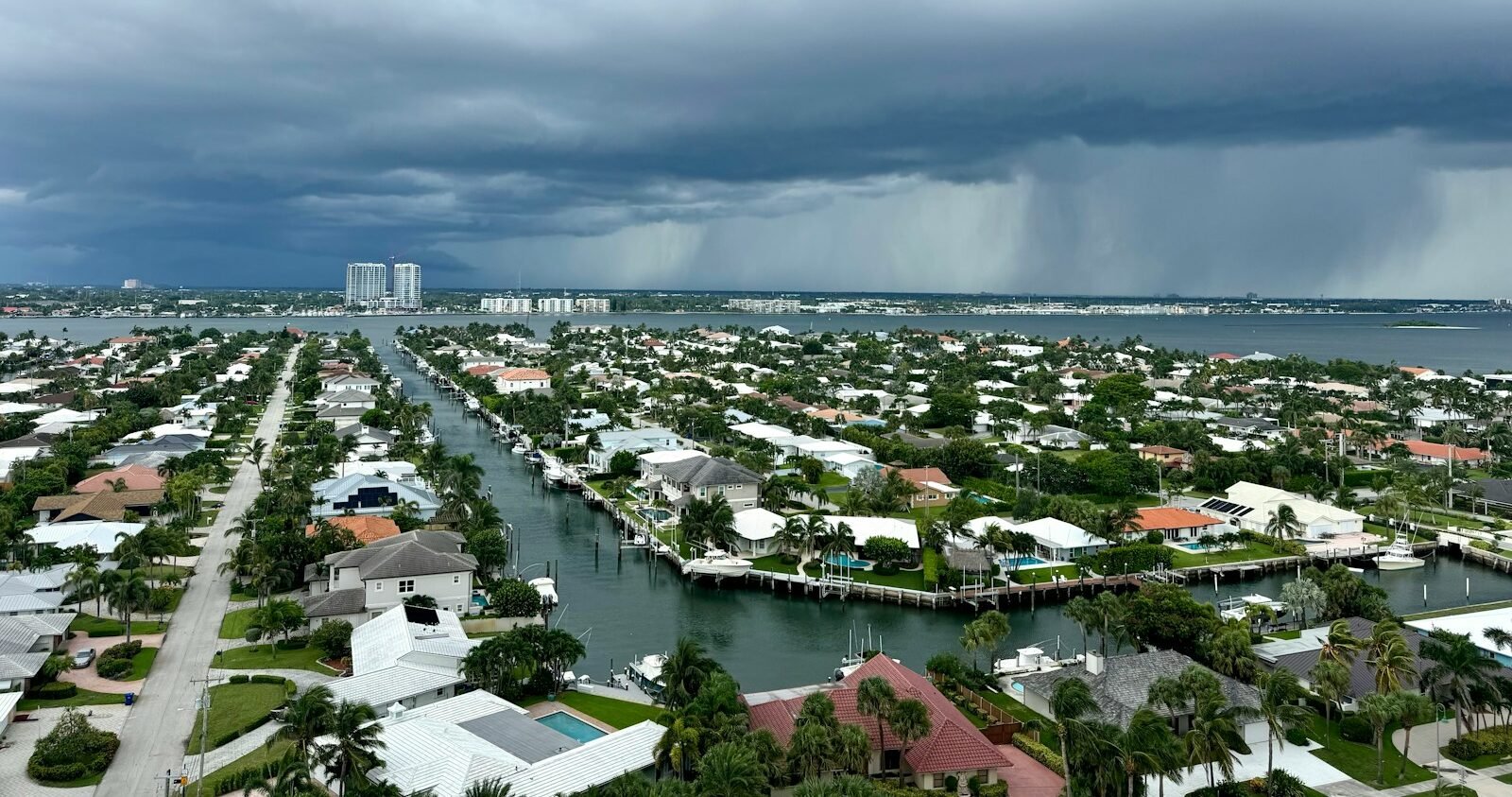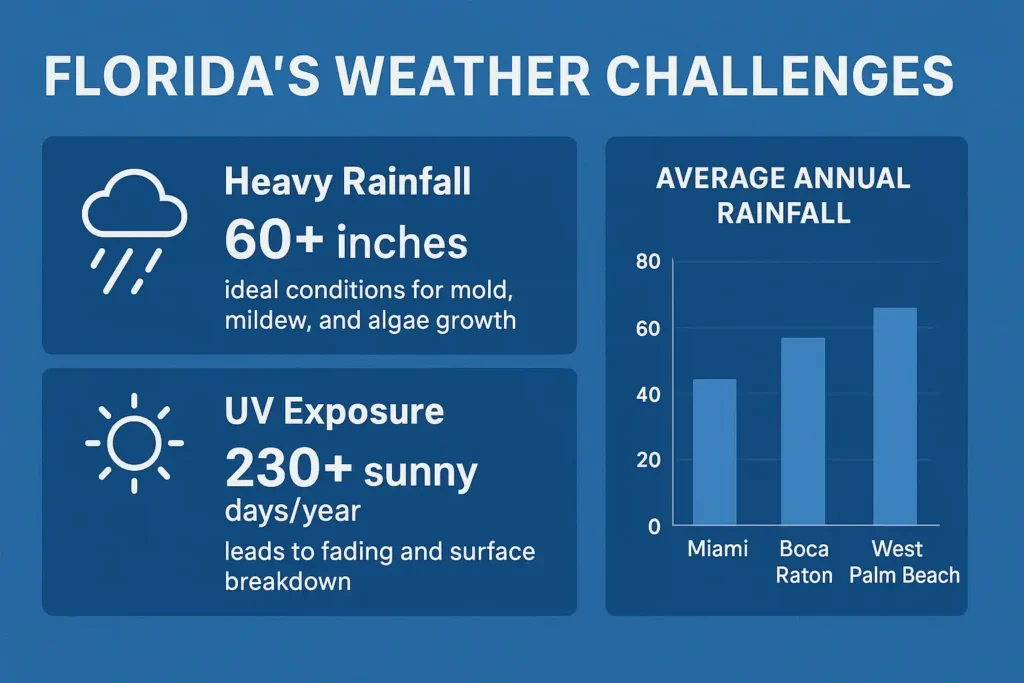
When you pick the right sealer, you give your pavers the best defense against Florida’s harsh elements. The best paver sealer for Florida uses UV inhibitors to reduce sun damage and keep colors vibrant. Water repellency stops moisture from seeping in, which helps prevent stains and freeze-thaw damage. Mold and algae resistance keeps surfaces clean and safe, so Florida residents enjoy attractive, long-lasting pavers.
In Florida, sealing pavers isn’t just about aesthetics—it’s about protection. With an average of over 50 inches of annual rainfall, humidity levels that often exceed 74%, and intense UV exposure nearly year-round, Florida’s climate can be harsh on unsealed surfaces. Left untreated, pavers can fade, shift, crack, or develop mold and algae within just a few seasons.
Take, for example, a Boca Raton homeowner who invested in a premium wet-look sealer. Within a year, not only did their pavers maintain their vibrant color despite constant sun exposure, but the sealed surface also resisted water stains during hurricane season. This kind of long-term resilience highlights why the right paver sealer is an essential investment for Florida homeowners.

Florida’s unique climate puts pavers under constant stress:
Local contractors confirm these risks and one of our paver specialist explains:
“In Florida, sealing isn’t optional—it’s preventive maintenance. A good sealer protects against fading, resists algae, and locks the sand in place so the entire system lasts years longer.”
The sun in Florida shines with relentless intensity. Prolonged UV exposure causes fading and discoloration, especially on pavers that lack UV protection. You may notice the vibrant color of your pavers turning dull or washed out over time. The breakdown of pigments leads to surface erosion and weakens the structure. Expansion and contraction from heat can also cause cracks. In places like Fort Myers, the high UV index speeds up the deterioration of paving materials. Outdoor tests show that unsealed pavers exposed to the sun experience photodegradation, which results in cracking and loss of strength.
Tip: Regularly check your pavers for signs of fading or surface wear, especially in sunny areas.
Florida weather includes frequent rain and high humidity, which both impact your pavers. Heavy rainfall can wash away the sand between pavers, causing them to shift or settle unevenly. Water can erode the base underneath, leading to instability. High humidity keeps surfaces damp, which increases the risk of erosion and makes repairs more common. Inadequate drainage allows water to pool, worsening these problems. The table below shows how different seasons affect paver sealing:
| Season | Conditions Affecting Sealing |
|---|---|
| Dry Season | Lower humidity, steady temperatures, less rainfall |
| Rainy Season | Frequent downpours, high humidity, disrupts sealing |
| Spring | Good before rainy season, but sudden storms possible |
You will often see mold and algae on pavers in Florida, especially if they remain unsealed. High humidity and regular rain create the perfect environment for these organisms. Mold, mildew, and algae thrive on damp surfaces, particularly in shaded spots. Unsealed pavers absorb moisture, making it easier for mold to grow. In places like Oviedo, spills and dirt can penetrate the surface, further encouraging mold and algae growth. Homeowners often struggle with stains, slippery surfaces, and unsightly green or black patches.
By understanding these weather challenges, you can take steps to protect your pavers and keep them looking their best.
Choosing the best paver sealer for Florida means you protect your outdoor surfaces from the toughest local conditions. You need a product that stands up to intense sun, heavy rain, and high humidity. The best paver sealer uses advanced formulas with UV inhibitors, water repellency, and mold prevention. These features keep your pavers looking fresh and strong year after year.
Florida’s sun can fade and damage pavers quickly. You need a sealer with strong UV inhibitors to block harmful rays and preserve color. The best paver sealer for Florida uses ingredients that shield your pavers from UV exposure and slow down fading. Laboratory tests show that nano sealers offer 100% UV resistance and last up to 10 years in Florida conditions. Other sealants may only last 1 to 2 years before you see signs of wear.
| Sealer Type | UV Resistance | Longevity in Florida Conditions |
|---|---|---|
| Nano Sealer | 100% | Up to 10 years |
| Other Sealants | Varies | 1-2 years |
You can find several products with proven UV protection. Ultra Seal Classic Gloss Wet Look Paver Sealer, SealThane, Paver Seal RX, and Seal RX Enhance all provide vibrant color enhancement and long-lasting defense against fading. These sealers help you maintain the beauty of your pavers, even under harsh sunlight.
Tip: Apply a UV-resistant sealer every few years to keep your pavers bright and prevent sun damage.
Rain and humidity in Florida can cause pavers to shift, stain, and erode. The best paver sealer creates a water-repellent barrier that stops moisture from soaking in. This barrier keeps your pavers dry and stable, even during heavy storms. Water-based formulas work well because they allow your pavers to breathe while blocking water.
High-quality water-based sealants last between 3 to 5 years. Acrylic sealers, which only coat the surface, last 2 to 3 years. You should reseal your pavers every 2 to 3 years to keep water out and maintain stability.
Florida’s humidity creates the perfect environment for mold and algae. The best paver sealer for Florida uses water-based formulas that manage moisture and block biological growth. These sealers form a breathable barrier, which prevents water absorption and reduces the risk of mold and mildew. Products like Ultra Seal Classic Gloss Wet Look Paver Sealer and SealThane offer joint stabilization and inhibit weed growth. Paver Seal RX also protects against fading and wear.
Note: Choose a sealer with low VOCs and environmental safety for healthier outdoor spaces.
You want your pavers to last for years without constant maintenance. The best paver sealer uses durable ingredients that withstand Florida’s weather. Silane and siloxane sealers offer breathability and deep protection. These formulas penetrate the surface, so your pavers resist stains, fading, and biological growth. Most manufacturers recommend resealing every 1 to 3 years, depending on traffic and exposure.
| Product Name | Key Features |
|---|---|
| Ultra Seal Classic Gloss Wet Look Sealer | Vibrant color, long-lasting protection against staining, fading, and weathering |
| SealThane | Deep color enhancement, long-lasting protection against staining and weathering |
| Paver Seal RX | Clear sealer, wet look, protects against fading and staining |
| Seal RX Enhance | Penetrating stone sealer, enhances color, long-lasting protection against fading |
You can rely on the best paver sealer to keep your outdoor surfaces strong and attractive. Regular resealing ensures your pavers stay protected from Florida’s sun, rain, and humidity.
When you want the paver sealer for Florida, you need to consider both performance and safety. Water-based paver sealers work best for most homes because they have low VOCs, do not emit harmful fumes, and are safer for your family and the environment. Solvent-based paver sealers, on the other hand, contain more VOCs and can release toxic fumes during application.
Here’s a quick comparison to help you decide:
| Best Paver Sealer for Florida Key Elements | Water-Based | Solvent-Based |
|---|---|---|
| VOC’s | Low | High |
| Color Change | Subtle | Strong “wet look” |
| Film | Thin, durable | Thick, may peel |
| Adhesion | Deep penetration | Surface only |
| Toxicity | Non-toxic | Toxic fumes |
| Finish | Natural, Satin, Low Gloss | High Gloss |
| Duration | 3–5 years | 2–5 years |
| Best For | Chemical Protection | Color Enhancement |
Water-based paver sealers also cure faster and resist re-emulsifying in water or oil. You protect your pavers and the environment at the same time.
Tip: Water-based paver sealers do not require as many safety precautions and are easier to clean up after use.
Proper paver sealing starts with the right tools and techniques. Use a pump sprayer or paint roller for even coverage. Always apply the sealer in thin layers to avoid streaks and bubbles. Let the first coat dry for at least two hours before adding a second coat for extra durability. Keep foot traffic off for 24 hours and vehicles off for 48 hours to ensure a strong cure, especially in high traffic zones.
Common mistakes to avoid:
Regular maintenance includes inspecting your pavers every year and resealing every 2 to 5 years, depending on wear and tear.
Timing matters for paver sealing in Florida. The best results come when you seal during the fall or early winter. These seasons offer cooler temperatures and less rain, giving you dry weather windows for proper curing. Sealing during dry conditions helps the sealer bond well, prevents water penetration, and reduces the risk of mold growth. Always check the forecast and pick a stretch of dry weather to maximize durability and appearance.
Note: Avoid sealing in rainy weather or during summer storms, as moisture can ruin the finish and shorten the life of your sealer.
With the right timing, tools, and product, you keep your pavers looking great and reduce maintenance for years to come.
Choosing the best paver sealer gives florida residents lasting protection against sun, rain, and humidity. You see less maintenance, lower costs, and safer surfaces around your home. Florida residents enjoy vibrant colors and strong pavers that resist stains and weather damage. Sealed pavers help Florida residents keep property values high. Regular sealing means florida residents spend less time on repairs and more time enjoying beautiful outdoor spaces.
You should reseal your pavers every 2 to 3 years. High-traffic areas or spots with heavy sun may need more frequent attention. Regular inspection helps you spot early signs of wear.
You can apply sealer yourself with basic tools like a pump sprayer or roller. If you want a flawless finish or have large areas, a professional can save you time and effort.
Sealing wet pavers traps moisture, which can cause hazing, bubbling, or peeling. Always let your pavers dry completely before applying any sealer for the best results.
Some sealers add a glossy finish that may feel slick when wet. You can choose a sealer with an anti-slip additive to keep your surfaces safe.
Tip: Always check the product label for slip resistance if you have pool decks or walkways.


Since 2019, hundreds of homeowners, like you, have trusted us to restore and rejuvenate their pavers. Join the 360+ satisfied clients who have experienced the difference our expertise brings. Once again, you can rely on us to make your outdoor spaces look stunning and inviting.
Don’t wait any longer to give your pavers the care they deserve. Our expert team is ready to restore your outdoor areas to their full glory. Whether it’s a patio, walkway, or driveway, let us enhance the beauty and durability of your pavers. Contact us now for a free consultation and let’s begin your journey to a more beautiful home exterior.